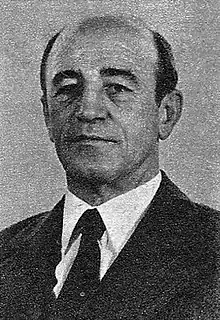Prokop Murra
Prokop Murra (24 November 1921 – 9 September 2005) was an Albanian politician of the Albanian Party of Labour (PPSh).
Prokop Murra | |
|---|---|
 | |
| Minister of People's Defence | |
| In office 23 November 1982 – 9 July 1990 | |
| President | Enver Hoxha Ramiz Alia |
| Prime Minister | Adil Çarçani |
| Preceded by | Kadri Hazbiu |
| Succeeded by | Kiço Mustaqi |
| Personal details | |
| Born | 24 November 1921 Tirana, Albania |
| Died | 9 September 2005 (aged 83)[1] Tirana, Albania |
| Political party | Party of Labour of Albania |
| Signature | .svg.png.webp) |
Early life
Murra was born on 24 November 1921 in Tirana, and studied economics.[2] He joined the Albanian Communist Party in 1943 and fought during World War II as a partisan of the National Liberation Movement.[2] He initially worked as a functionary of the party in the economic sector,[3] and petroleum industry. In 1956 he became member of the Central Committee of the Party.[2]
Rise in the party
In 1962, he was elected for the first time as representative in the People's Assembly, and remained such until the fifth legislature ending in 1966. In the '70s, he was temporarily First Secretary of PPSh in Shkodra.[4] Furthermore, he was temporarily Deputy Chairman of the State Planning Commission 1980–1981.[3]
At the 7th Congress of the Party which took place in November 1976, Murra was elected member of the Secretariat of the Central Committee of the Party. He held this position until April 1980.
Between 1978 and 1991, he served again from the ninth to eleventh legislature as representative in the National Assembly.
On April 26, 1980, he was Minister of Industry and Mines in the last government of Prime Minister Mehmet Shehu.
Murra succeeded at the 8th Party Congress in November 1981 to become candidate-member of the Politburo of the Party of Labour of Albania, but was removed from the Secretariat of the Central Committee.[5] In the subsequent government of Adil Çarçani, he served as Minister of Energy (the Ministry of Industry and Mines was split) until 1 July 1982 when he was replaced by Pali Miska.[3]
Defence Minister (1982-1990)
He served shortly as Party's Secretary in Tirana District, before being replaced by Gaqo "Gogo" Nesho[5] and becoming Minister of People's Defence (Albanian: Minister i Mbrojtjes Popullore) on November 23, 1982. His appointment as Defense Minister was surprising, since he was the first civilian in this position since the founding of the People's Republic of Albania on 11 January 1946.[3] In a speech he gave shortly after the death of Enver Hoxha, he stated that Albania would never establish relations with the superpowers as United States and Soviet Union, and focus on "self-reliance".[6] At the 9th Congress of the Party in 1986, he became member of the Politburo.[7][8] With Ramiz Alia coming into power after Hoxha's death, he was later removed from the Politburo as a "hard-liner", thus not Alia's favorite.[9] After retiring from the government on July 9, 1990, he was replaced by Kiço Mustaqi as Minister of Defense.[10]
Post-politics
In 1993, a court process came up against Murra and nine other former high-ranking officials (Muho Asllani, Besnik Bekteshi, Foto Çami, Hajredin Çeliku, Lenka Çuko, Llambi Gegprifti, Qirjako Mihali, Pali Miska, and Vangjel Çërrava).[11] They were accused of "abuse of funds". The court in Tirana came up with the following sentences: Mihali and Gegprifti eight years each, Miska and Çuko seven years each, Çami, Çeliku, and Bekteshi six years each, and Çërrava, Murra and Asllani five years each.[12][13]
Another case rose against him and others in June 1996, this time for "crimes against humanity", according to Art. 74, 67 and 25 of the Albanian Penal Code. Other co-defendants were the former Party local-level politicians as Muho Asllani, Foto Çami, Gaqo Nesho, former 1st secretary of the PPSh in Vlora and Tirana, Zef Loka, former director in the Ministry of Internal Affairs, and Dilaver Benghazi, former Deputy Minister of the Interior.[14] Decision was carried out in August 1996. Murra received 20-year prison sentence, Asllani and Loka 18, Nesho 16 years and Benghazi 12 years.[15] They would serve their terms partially. An amnesty came out after the turmoils of 1997.
References
- Dervishi, Kastriot (2012). Kryeministrat dhe ministrat e shtetit shqiptar në 100 vjet. Tiranë: Shtëpia Botuese "55". p. 273. ISBN 978-99943-56-22-5.
- Historical Dictionary of Albania - Robert Elsie, p.314-315
- Yearbook on International Communist Affairs, Milorad M. Drachkovitch, Lewis H. Gann, Hoover Institution Press., 1983, p.238-239 (Yearbook on International Communist Affairs series)
- United States. Consulate General (Hong Kong, China), 1970, p.102
- Quarterly economic review of Rumania, Bulgaria, Albania, Issue 1, Economist Intelligence Unit., 1982, p.xli
- Daily Report: Eastern Europe, Issues 40–61, 1987, p.38-39
- Keesing's Record of World Events, Volume 33, Longman, 1987, p.xxxii
- East European Leadership List (10. February 1989)
- The search for Greater Albania, Paulin Kola, 2003, p.198
- Albanian Key Ministries
- UA 435/93 – Albania: legal concern: Muho Asllani, Besnik Bekteshi, Foto Cami, Hajredin Celiku, Vangjel Cerrava, Lenka Cuko, Llambi Gegprifti, Qirjako Mihali, Pali Miska, Prokop Murra
- Fred Abrahams: Human rights in post-communist Albania, Human Rights Watch/Helsinki, S. 36, ISBN 1564321606, 1996
- Kathleen Imholz: CAN ALBANIA BREAK THE CHAIN? THE 1993–1994 TRIALS OF FORMER HIGH COMMUNIST OFFICIALS Archived 2014-05-06 at the Wayback Machine
- ATA NEWS: DEFENCE ATTORNEYS REQUEST INNOCENCE FOR SIX FORMER SENIOR PLA OFFICIALS (19. Juni 1996)
- ATA NEWS: EX COMMUNIST SENIOR OFFICIAL RELEASED FROM THE COURT HALL (13. August 1993)